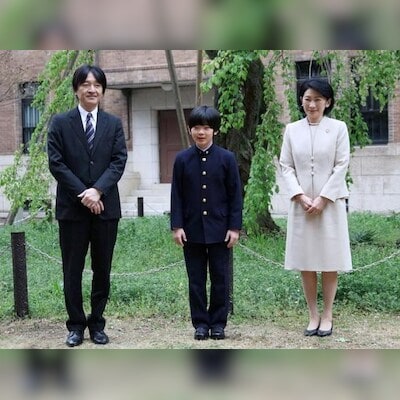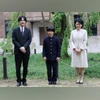Hisahito becomes 1st Japanese royal male in 40 yrs to reach adulthood | World News

)
Prince Hisahito, accompanied by his parents, at Ochanomizu University junior high school before attending the entrance ceremony in Tokyo in April | Reuters
In a big milestone for Japan’s royal family, Prince Hisahito turned 18 on Friday, becoming the first male royal family member to reach adulthood in almost four decades.
It is a significant development for a family that has ruled for more than a millennium but faces the same existential problems as the rest of the nation a fast-aging, shrinking population.
Hisahito, who is set to become the emperor one day, is the nephew of Japanese Emperor Naruhito. His father, Crown Prince Akishino, was the last to do so, in 1985.
Hisahito is the youngest of the 17-member all-adult imperial family, which currently has only four men.
His status as the last heir apparent poses a major problem for a system that doesn’t allow empresses. The government is debating how to keep succession stable without relying on women.
The 1947 Imperial House Law, which largely preserves conservative pre-war family values, only allows a male to succeed to the throne and forces female royal members who marry commoners to lose their royal status.
His older cousin, Princess Aiko, the only child of Naruhito and his wife Masako, a Harvard-educated former diplomat, is the general public’s favorite as the future empress. But the existing law forbids her to take over that role even though she comes from a direct line of descent.
The succession chart can get confusing: Naruhito is the emperor. His brother, Akishino, is second in line. Hisahito, the son of Akishino, comes next.
An earlier proposal to allow an empress after Aiko’s birth was shelved as soon as Hisahito was born in 2006.
Right now I would like to cherish my remaining time in high school,” Hisahito said in a statement. He has long been interested in insects and even co-authored an academic paper on a survey of dragonflies on the grounds of his Akasaka estate in Tokyo, the statement said.
A largely conservative government-commissioned panel of experts in January 2022 recommended that the government propose allowing female members to keep royal status after marriage as a way to prevent the declining population within the imperial family, while adopting male descendants from now-defunct royal families to continue the male lineage with distant relatives.
Critics say those measures would have a limited effect as long as the male-only succession is maintained because it was workable largely with the help of concubines in the pre-modern era.
(Only the headline and picture of this report may have been reworked by the Business Standard staff; the rest of the content is auto-generated from a syndicated feed.)
First Published: Sep 06 2024 | 8:43 PM IST




